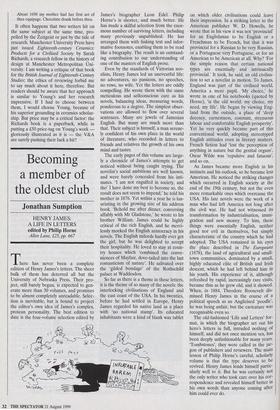Becoming a member of the oldest club
Jonathan Sumption
HENRY JAMES: A LIFE IN LETTERS edited by Philip Horne Allen Lane, £25, pp. 667 There has never been a complete edition of Henry James's letters. The sheer bulk of them has deterred all but the University of Nebraska Press, Their pro- ject, still barely begun, is expected to gen- erate more than 30 volumes, and promises to be almost completely unreadable. Selec- tion is inevitable, but is bound to project the editor's own idea of James's complex, protean personality. The best edition to date is the four-volume selection edited by James's biographer Leon Edel. Philip Home's is shorter, and much better. He has made a skilful selection from the enor- mous number of surviving letters, including many previously unpublished. He has arranged them with linking text and infor- mative footnotes, enabling them to be read like a biography. The result is an outstand- ing contribution to our understanding of one of the masters of English prose.
Even by the standards of Victorian nov- elists, Henry James led an uneventful life: no adventures, no passions, no speeches, no rows, no wife. Yet the letters are oddly compelling. He wrote them with the same meticulous and selfconscious care as his novels, balancing ideas, measuring words, ponderous to a degree. The simplest obser- vations are allowed to flow over several sentences. Many are jewels of Jamesian English. But many are much more than that. Their subject is himself, a man serene- ly confident of his own place in the world of literature, who recorded in letters to friends and relatives the growth of his own mind and tastes.
The early pages of this volume are large- ly a chronicle of James's attempts to get noticed without being caught trying. The novelist's social ambitions are well known, and were barely concealed from his inti- mates. am not engulfed in society, and tho' I have done my best to become so, the result does not seem to impend,' he told his mother in 1876. Yet within a year he is lux- uriating in the growing size of his address book. 'Behold me after dinner, conversing affably with Mr Gladstone,' he wrote to his brother William. James could be highly critical of the rich English, and he merci- lessly mocked the English aristocracy in his novels. The English milords hardly ever got the girl, but he was delighted to accept their hospitality. He loved to stay at coun- try houses which 'combined the conve- niences of Mayfair, dove-tailed into the last romanticism of nature'. He salivated over the 'gilded bondage' of the Rothschild palace at Waddesdon.
So far as there is a theme in these letters, it is the theme of so many of the novels: the interlocking civilisations of England and the east coast of the USA. In his twenties, before he had settled in Europe, Henry James regarded his native land as a place with `no national stamp'. Its educated inhabitants were a kind of blank wax tablet on which older civilisations could leave their impression. In a striking letter to the American publisher W. D. Howells, he wrote that in his view it was not 'provincial' for an Englishman to be English or a Frenchman to be French, but that it was provincial for a Russian to be very Russian, or a Portuguese very Portuguese, or for an American to be American at all. Why? 'For the simple reason that certain national types are essentially and intrinsically provincial.' It took, he said, an old civilisa- tion to set a novelist in motion. To James, England was part of the civilised world, America a mere pupil. 'My choice,' he wrote in one of his notebooks (quoted by Home), 'is the old world: my choice, my need, my life'. He began by viewing Eng- land from the outside, a place of 'deep decency, earnestness, constant, strenuous labour and comfortable English prosperity'. Yet he very quickly became part of this conventional world, adopting stereotyped English attitudes even in literary matters. French fiction had 'lost the perception of anything in nature but the genital organs', Oscar Wilde was 'repulsive and fatuous', and so on.
As James became more English in his instincts and his outlook, so he became less American. He noticed the striking changes which occurred in English society at the end of the 19th century, but not the even more remarkable ones which overcame the USA. His late novels were the work of a man who had left America not long after the civil war. He had not witnessed its transformation by industrialisation, immi- gration and new money. To him, these things were essentially English, neither good nor evil in themselves, but simply characteristic of the country which he had adopted. The USA remained in his eyes the place described in The Europeans (1878), the land of agricultural and small- town communities, dominated by a small, highly educated elite of British and Irish descent, which he had left behind him in his youth. His experience of it, although refreshed by rapid, increasingly rare visits, became thin as he grew old, and it showed. When, in 1884, Theodore Roosevelt dis- missed Henry James in the course of a political speech as an Anglicised 'poodle', he was being unfair, but the caricature was recognisable even so.
The old-fashioned 'Life and Letters' for- mat, in which the biographer set out his hero's letters in full, intruded nothing of himself, and did not once mention sex, has been deeply unfashionable for many years. `Tombstones', they were called in the jar- gon of publishers and reviewers. The main lesson of Philip Home's careful, scholarly volume is that the type deserves to be revived. Henry James lends himself partic- ularly well to it. But he was certainly not the only writer who took care over his cor- respondence and revealed himself better in his own words than anyone coming after him could ever do.


























































 Previous page
Previous page